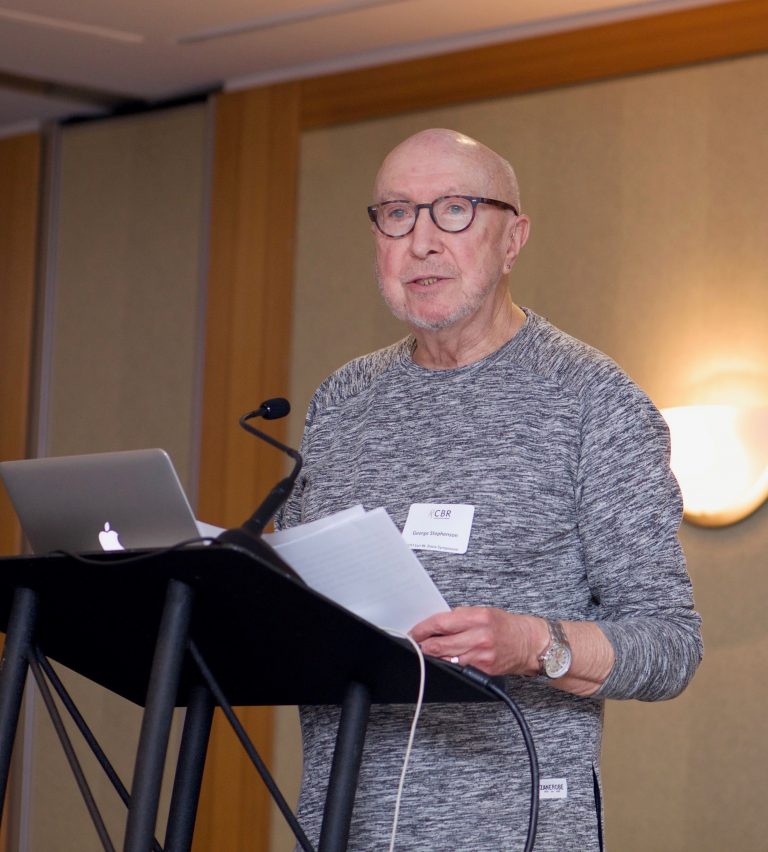 By Wayne Zhao, PhD Student, Devine Lab
By Wayne Zhao, PhD Student, Devine Lab
Haemophilia is a rare genetic disorder that impairs the blood coagulation system. In 2014, there were more than 3000 registered patients with haemophilia in Canada. George Stephenson has been living with mild haemophilia all of his life. He was a young teen when the first treatment (fresh whole blood) for haemophilia was introduced in Canada in 1947[i]. George’s life was dramatically impacted by the disorder, as he explained during his speech at the 2017 Earl Davie Symposium. Now 84 years old, he has lived through several iterations of improved treatments but thinks we can still do better. I was honoured to sit down with George after the symposium for an interview about his opinion on haemophilia and the medical field in general.
Q: Tell me a little bit about mild haemophilia.
A: There are generally three degrees of haemophilia: severe, moderate, or mild. Unlike moderate or severe haemophilia, where symptoms manifest quickly after bleeding begins, mild haemophilia is sneaky. As a patient with mild, I am unsure whether an injury will cause me to bleed. Symptoms can take up to two or more days to show, and by that time it is already late to start treatment. I follow the rule: “When in doubt, treat with Factor VIII.”
Q: How has living with mild haemophilia affected your daily life?
A: I learned to be cautious without letting the condition distract me from what life offers. In addition, I usually carry Factor VIII with me when I travel. When I was in high school I wanted to take up boxing, but due to my condition, I gave up on that dream. However, I have always believed that the approach is not to limit oneself, but to develop “street smartness” to better protect oneself.
Q: How do you obtain treatment/medication?

George Stephenson at 2017 Earl Davie Symposium
A: In Canada it is very easy to get Factor VIII for infusion. The medication comes in a self-administered syringe like the Epipen, except that it is infused directly into a vein. I learned to self-infuse many years ago, and that has served me very well. Not all patients with mild haemophilia learn to self-infuse because of the relatively infrequent need. The medication is fully covered by insurance. However, it is a very different case in other countries. For example, my nephew in the USA who is also living with haemophilia, must worry about its availability and having to pay for it out of his own pocket.
Q: In your opinion, how can the health care system improve to provide better treatment for patients with haemophilia?
A: There are many undiagnosed patients out there – especially in rural areas. The haemophilia clinic in St. Paul’s hospital is already exerting major efforts, looking for these people and is ready to provide advice/consultation when they surface. Patients with haemophilia in these areas are only beginning to learn to use the medication, and their caregivers are often unfamiliar with the disorder and how to deal with it. Throughout my life, I have definitely seen great improvements in our health care system with regard to access to necessary medications, such as factor VIII.
There is, however, a surprising lack of knowledge on how to treat haemophilia in the medical community. Dentists, paramedics, and even some family physicians are unaware of the complications of haemophilia. Often, I have found myself educating the medical professionals on how to treat me when I’m injured. To me, this is very unusual. I have spoken to medical undergraduate students, and haemophilia is often not taught in medical school. I think the awareness of haemophilia in our health care system definitely could be improved.
Q: If you had a one million dollar grant to give, what kind of research would you fund to help people living with haemophilia?
A: I would look to fund gene therapy research. Gene therapy has the potential to bring about a change in the gene and eliminate the need for repeated Factor VIII injections. CRISPR technology can also be used in conjunction with gene therapy to target the disorder on a genetic level. I would also be interested in seeing research on new delivery methods of the medication. As I am getting older, it is harder to inject Factor VIII with unsteady hands. Now, because of that, I am turning to HomeCare or my haemophilia clinic to infuse the Factor VIII.
For further reading on the history and treatment of hemophilia in Canada, visit the Canadian Hemophilia Society (www.hemophilia.ca).
[i] http://www.hemophilia.ca/en/bleeding-disorders/hemophilia-a-and-b/the-history-of-hemophilia/


